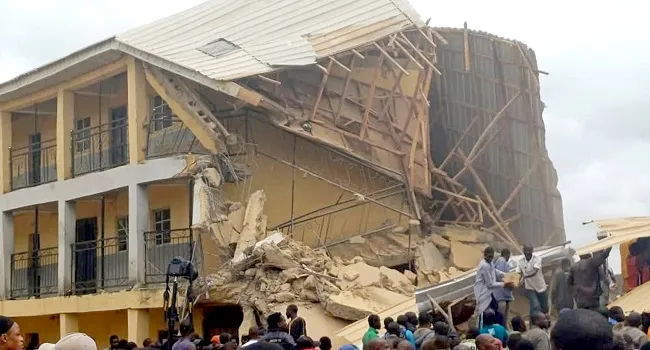Experts in Nigeria’s construction sector are ringing the alarm bells over the widespread use of substandard building materials, warning of the dangers they pose to lives, property, and the overall stability of the real estate market.
Former President of the Nigeria Institute of Structural Engineers (NISE), Victor Oyenuga, identified the proliferation of inferior materials as a significant contributor to the alarming frequency of building collapses across the country.
Statistics reveal that between 1970 and 2020, Nigeria recorded 12 major building collapse disasters, ranking it among countries like India, China, and Egypt that have grappled with similar crises. While factors such as unprofessional practices, inadequate oversight, and unethical behavior among industry professionals play a role, the use of substandard materials has been pinpointed as a root cause of these tragedies.
Oyenuga emphasized that the lack of government monitoring and enforcement has allowed the unchecked production and sale of these materials to thrive. He noted that manufacturers who adhere to quality standards are often undercut by producers offering cheaper, subpar alternatives, leaving developers to prioritize cost over safety.

“The government needs to set clear guidelines for manufacturers, especially for critical materials like steel and blocks, and enforce these standards rigorously. Regular inspections must be conducted at production sites, and when materials are found to be below standard, those sites should be shut down. Only then will we begin to see a shift toward quality and safety,” Oyenuga remarked.
He also highlighted the long-term financial impact of using inferior materials. “Building with substandard materials is a false economy. You save money upfront, but when the structure collapses, you lose even more in rebuilding costs, not to mention the potential loss of lives. It’s simply not worth the risk,” he stated.
Architect Wasiu Olalekan painted an even grimmer picture, citing widespread issues with key materials like iron rods and cement. He explained that many iron rods sold as 12mm in diameter fail to meet that measurement, and the quality of cement has deteriorated due to improper mixing ratios. According to Olalekan, some developers knowingly use these materials to cut costs, further exacerbating the problem.
“This is a systemic issue in our industry. Developers often prioritize profit over quality, and even buyers of pre-built homes face uncertainties about the materials used during construction. Without stricter oversight and accountability, this problem will persist,” Olalekan warned.
He commended states that require developers to sign undertakings before commencing construction, noting that such measures could encourage adherence to standards. However, he stressed the need for broader enforcement mechanisms across the country.
Engr. Nasiru Dantata, former president of the Federation of Construction Industry (FOCI), reassured that projects handled by FOCI member companies meet high standards. He praised the cement industry for maintaining quality but pointed out that improper use of materials by developers often undermines these efforts.

“Even with high-quality materials available, the issue lies in their application. For instance, if a developer uses less cement than required in the mix, the building may stand initially but will not withstand the test of time,” Dantata explained.
He urged the Council for the Regulation of Engineering in Nigeria (COREN) to intensify its monitoring and enforcement efforts, stressing that stricter regulation is crucial for the sector. Dantata called for the construction industry to be policed with the same vigor as vehicle administration and road safety, as the stakes are equally high.
Experts agree that addressing the menace of substandard building materials will require coordinated efforts from government agencies, industry regulators, and developers. Without immediate action, Nigeria risks further tragedies and setbacks in its construction sector, endangering lives and undermining public trust. The time for accountability and reform is now.



